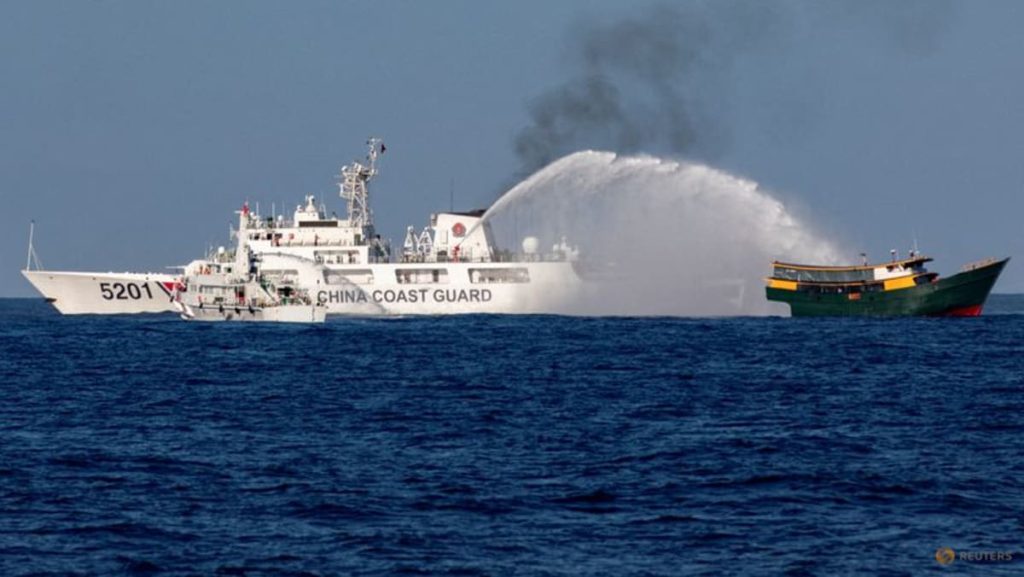The recent incident involving Chinese and Philippine vessels near the Scarborough Shoal has reignited tensions in the South China Sea, highlighting the ongoing dispute over sovereignty and maritime rights in the region. Philippine officials accused the Chinese Coast Guard of using water cannons and aggressively maneuvering against a Philippine supply vessel en route to resupply Filipino fishermen at the shoal. This action has drawn sharp criticism from the United States, further complicating the already delicate geopolitical balance in the area. The Scarborough Shoal, known as Huangyan Island in China, lies within the Philippines’ Exclusive Economic Zone (EEZ) as defined by the United Nations Convention on the Law of the Sea (UNCLOS). However, China claims sovereignty over the shoal and the surrounding waters, a claim that has been repeatedly rejected by international legal bodies.
China’s assertion of control over the Scarborough Shoal and surrounding waters is based on its expansive “nine-dash line” claim, which encompasses a vast area of the South China Sea, including territories claimed by several Southeast Asian nations. This claim was invalidated in a 2016 ruling by an international tribunal constituted under UNCLOS, which found no legal basis for China’s historical claims and affirmed the Philippines’ sovereign rights within its EEZ. Despite this ruling, China has refused to recognize the tribunal’s decision and continues to assert its claims, leading to frequent confrontations with other nations in the region, particularly the Philippines and Vietnam. China’s recent submission of nautical charts to the United Nations, purportedly supporting its claims, further underscores its defiance of international law and its determination to solidify its presence in the disputed waters.
The Philippines, backed by international law and the 2016 tribunal ruling, maintains its sovereign rights over the Scarborough Shoal and its surrounding EEZ. This EEZ grants the Philippines exclusive rights to explore, exploit, conserve, and manage the natural resources within the designated maritime zone, including fishing rights. China’s actions, including the recent water cannon incident, are viewed by the Philippines as a violation of its sovereign rights and a threat to the livelihoods of Filipino fishermen who traditionally operate in the area. The Philippines has consistently called for a peaceful resolution to the dispute, emphasizing the importance of adhering to international law, particularly UNCLOS, in resolving maritime disputes.
The ongoing tensions surrounding the Scarborough Shoal underscore the broader challenges facing the South China Sea, a vital waterway for global trade and a region rich in natural resources. China’s assertive actions, coupled with its disregard for international law, have raised concerns about regional stability and the potential for further escalation. The United States, while not a claimant in the South China Sea disputes, has a strong interest in maintaining freedom of navigation and upholding international law in the region. The US has repeatedly condemned China’s actions and has conducted freedom of navigation operations in the South China Sea to challenge China’s excessive maritime claims and reaffirm the principles of international law.
The Association of Southeast Asian Nations (ASEAN), which includes several claimant states in the South China Sea, has been engaged in negotiations with China to develop a Code of Conduct (COC) aimed at managing tensions and preventing escalation in the disputed waters. However, progress on the COC has been slow, with significant disagreements remaining on key issues, including the geographical scope of the code and the legal basis for its provisions. Some ASEAN members insist that the COC must be grounded in UNCLOS and reflect the 2016 tribunal ruling, while China prefers a less binding agreement that avoids explicit references to international law. The lack of a comprehensive and legally binding COC continues to contribute to uncertainty and instability in the region.
The incident at Scarborough Shoal serves as a reminder of the complex and unresolved maritime disputes in the South China Sea. China’s continued disregard for international law and its assertive actions pose a significant challenge to regional stability and the rule of law. The Philippines, along with other claimant states, faces the difficult task of balancing the need to protect its sovereign rights and economic interests with the imperative of avoiding escalation and maintaining peaceful relations with China. The international community, including the United States, has a crucial role to play in upholding international law, supporting a rules-based order, and promoting peaceful resolution of disputes in the South China Sea. The development of a robust and legally binding Code of Conduct, grounded in UNCLOS, remains a critical step towards achieving lasting peace and stability in this strategically important region.










